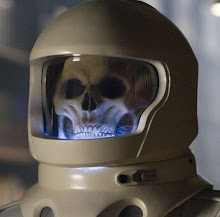 It didn't take me as long to read How to Live Safely in a Science Fictional Universe as I thought it would. I got a lot of reading done on Tuesday night, so I got it finished in about a day (It's taken me about five times as long to write this review).
It didn't take me as long to read How to Live Safely in a Science Fictional Universe as I thought it would. I got a lot of reading done on Tuesday night, so I got it finished in about a day (It's taken me about five times as long to write this review).The plot of HTLSIASFU (It's a loooooooong title) is a pretty odd one. The main character is Charles Yu, a time machine repair man; it's his job to stop paradoxes, and mend problems in the space-time continuum caused by other time machines. But one day, he accidentally crosses his own timeline, and ends up shooting his future self. Locked in an endless loop, going round in circles - shooting his future self, then going on to be shot - he needs to figure out a way to break free and save his own life, or else he'll be trapped in a constant, unending cycle for all of eternity.
The plot isn't the only thing about the book that's really strange, as the writing is quite unusual as well. The book is written from a first-person perspective, everything happening from Charles' point of view. But it's more than that; the book is almost a monologue, filled with digressions and rambling from Charles. Several times, particularly in the earlier chapters, there are long gaps in the action where it's just Charles, alone in his ship, talking about his life, and the people in it. Even in the more eventful scenes, the bulk of the story is just Charles' thoughts and opinions. There's actually an in-story reason for this writing style, which I won't spoil, but I'll just say - everything he thinks is recorded into the book, which is why the writing is so digressive. It sounds pretty boring when I say it like that, but actually the monologues are interesting to read. The book's setting is intriguing and unusual; the story take place inside 'minor universe 31', an odd sci-fi style location, and this gives Charles some interesting things to talk about, which keeps his speeches fresh. The monologue style as a whole is a very clever way of doing a book, and I think it's the only way a story like this (filled with time travel and shifting logic) could be told coherently.
Another reason the monologues work so well is the genuine emotion in many of the later scenes. It's really easy to feel for the main character, because his relationship with his father (which plays a major part in the book) is set up so believably. The book doesn't look like an emotional story from the cover, but actually all of the science fiction threads running through the story are just background detail - ultimately, the book is about Charles and his relationship with his dad. The author (whose name is also Charles Yu, make of that what you will) could easily have set this story in the present day without changing too many of the main themes or characters, but I think the sci-fi setting gives the book variety and uniqueness - it's not often you can find a book that tells such a grounded, character-based story within the confines of such an unusual universe.
Outside of the odd way the tale is told, there isn't much else to say about the book. Usually I'd spend a bit of time discussing the characters, but really the only character we see a lot of is Charles. Most of the other characters (Ed, Tammy, Phil) are there to give Charles someone to talk to or react to, or to move the plot forward. I think I've already made it clear that Charles himself is an interesting and likable character, as you can't have a good monologue with a boring narrator - he's funny, self-deprecating, and easy to relate to. So that's pretty much all I've got to say about the book.
Bits and Bobs
- There's a lot of playing with tenses in the book, which is actually explained in the story - near the start, Charles claims that his ship's 'tense operator' is broken. As a result, there's quite a bit of did/doing/will do, the usual sort of mucking about with tenses that are, for me, among the highlights of time travel stories in general. I just love it when writers play with words like that, and Yu (the author, not the character) does it brilliantly.
- When I was reading the book, I was actually reminded of the Worst of the Time Lords comic strip. Probably because there are a lot of similarities between the two; both are monologues starring self-deprecating time travellers. I was also reminded quite a lot of the book Jpod by Douglas Coupland, simply because the rambling, digressing style of the books are very similar.
Updates on the blog will probably be a little irregular for a while, as I've been really tired lately and just haven't felt up to much writing. I'm going to try and keep it at least weekly, though, so the gaps between new posts hopefully won't be too small. The next book I'll be reviewing is Borrowed Time by Naomi A. Alderman, another Doctor Who story. I'll also probably be doing a review of the new Torchwood episode some time soon, or maybe I'll wait until the series has ended and review them all at once. Oh, and there should be a Friday Night Who UK update some time soon. That's all for now. Thanks for reading!

No comments:
Post a Comment